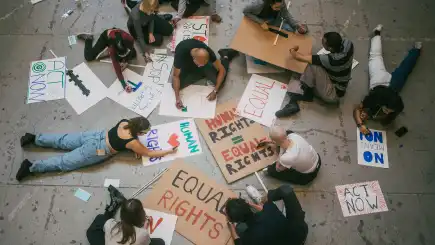Learn about civil liberties with online courses and programs
What are civil liberties?
Civil liberties are the fundamental rights and freedoms afforded to every individual in a society. They serve as a shield against government overreach and ensure that citizens can live their lives without undue interference. These liberties are typically enshrined in a nation’s constitution or legal framework and are essential components of a democratic society.
Key civil liberties include freedom of speech, permitting people to express their thoughts and opinions without fear of censorship or persecution. Freedom of religion ensures people can practice their faith without discrimination, while the right to privacy protects personal information.
Civil liberties are crucial for maintaining a just and equitable society, defending citizens from potential abuses of power by the government or other institutions. They promote individual autonomy, diversity of thought, and the free exchange of ideas, which are vital for the functioning of a democratic society.

Browse online civil liberties courses New
Civil liberties course curriculum
Civil liberties courses may delve deeper into the various rights afforded to people in a society. Some of the topics that learners might encounter in a civil liberties course can include:
Freedom of speech: Explore the limits and protections of freedom of speech, including issues related to hate speech, censorship, and the role of social media.
Freedom of religion: Examine the principles behind religious freedom, including the separation of church and state, the rights of religious minorities, and cases involving religious exemptions from laws.
Right to privacy: Delve into the evolving concept of privacy in the digital age, looking at issues like surveillance and data protection.
Equal protection under the law: Review civil rights and anti-discrimination laws, including topics such as racial and gender equality and LGBTQ+ rights.
Freedom of the press: Assess the role of the media in a democratic society, including issues like media ethics, censorship, and defamation laws.
Civil liberties courses can also teach you valuable skills including critical thinking, communication, and research skills that you can apply to your professional life. Are you ready to start learning? Explore the range of educational opportunities offered through edX that cover fields such as human rights, law, and more. Sign up for an accelerated boot camp, or enroll in a full degree program and start working toward a bachelor’s degree, or (for more advanced learners) a master’s degree in a relevant subject. You can also explore executive education programs specifically designed for busy professionals.
Explore civil liberties jobs
If you are passionate about civil liberties, a range of professional opportunities may be of interest to you. You can find jobs in government agencies, private businesses, and nonprofit organizations. Roles in this field include:
Civil rights attorney: Specializes in representing clients whose civil liberties have been violated.
Policy analyst or researcher: Studies and analyzes policies and laws related to civil liberties.
Activist: Works with nonprofit organizations and advocacy groups to raise awareness of civil liberties issues, mobilize public support, and push for policy changes that protect individual freedoms.
Academic or legal scholar: Teaches and conducts research in universities or law schools to contribute to the academic understanding of civil liberties.
Are you ready to explore this topic further? Start with courses offered through edX.
Last updated
